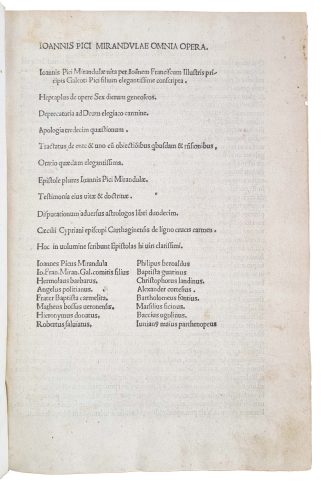PICO DELLA MIRANDOLA, Giovanni.
Omnia opera.
[Reggio Emilia, Lodovico Mazzali, 1506.]£4,500.00
Folio. ff. [262]. Roman letter. Decorated initials. Woodcut astrological diagram to k1. Occasional marginal finger-soiling or minor foxing, clean tear to l2 repaired, handful of ink stains or small marginal repairs, oil stain to upper margin of last 2 gatherings. A very good copy, on thick high-quality paper, in C17 French calf, marbled eps, raised bands, spine gilt, joints and extremities expertly repaired, a bit scratched, all edges sprinkled red and gilt.
A very good copy of this beautifully printed edition of the celebrated philosopher Giovanni Pico della Mirandola’s complete works, edited by his son Gianfrancesco and first published in 1496. Interestingly, this edition – the fifth overall – seeks to ‘mimic’ the second (Venice, 1498). The setting and type are nearly identical; there are only slight differences in the abbreviations and the use of woodcut initials.
The epitome of Renaissance humanism, Pico (1463-94) studied law at Bologna and philosophy at Ferrara and Padua, where he also trained in Arabic and Hebrew. In Florence, he met Angelo Poliziano, Girolamo Savonarola, Lorenzo de’ Medici and Marsilio Ficino. It opens with a life of Pico, written by his son. Of the following works only ‘Heptaplus’ and ‘Apologia’ had appeared in print during the author’s lifetime. ‘Heptaplus’, a commentary on Genesis 1 and the seven days of Creation, departing from traditional allegorical readings and drawing instead on Neoplatonic and Kabbalistic readings. ‘Deprecatoria’ is a short poem on the nature of God. Dedicated to Lorenzo de’ Medici, he important ‘Apologia’ – Pico’s defence against charges of heresy, which he was later forced to renounce – seeks to justify the writing of his ‘900 Theses’, or 900 grave questions on which he intended to hold a public debate in 1487. This was prevented by Innocent VIII and the work banned by the Church (with most copies burnt), causing Pico to flee abroad. Indeed, the ‘900 Theses’ are absent in all the early collected editions. Devised as an accompanying text to the ‘900 Theses’, ‘Oratio’ now stands as ‘the most succint expression of the mind of the Renaissance’ (Kirk). It famously focuses, especially in part I, on man’s dignity and uniqueness, and the importance of the discipline of reason and one’s will as a way to elevate man. A critique of Neoplatonic metaphysics, ‘De ente et uno’ represents ‘the abandonment of the long tradition which ran from Anselm and Lull to Nicholas of Cusa and Ficino in favour of the Christian Aristotelianism proposed by Thomas Aquinas’ (‘Camb. Hist. Ren. Phil.’, p.583). The ‘Epistolae’ gather correspondence between Pico and the greatest humanists of his day: Ermolao Barbaro, Angelo Poliziano, Aldus Manutius (here spelled ‘Altomanutio’), Battista Guarino and Cristoforo Landino. Clearly a selling point for the printer Lodovico Mazzali, their names are mentioned in the title. The unfinished ‘Adversus astrologos’ is a complex critique of judicial astrology. ‘The logical, methodological and epistemological complaints compiled by Pico had been well known since before the ancient sceptics recorded their objections. Pico’s real breakthrough was to use humanist philology as a new weapon against astrology, which he does not reject categorically’ (Stan. Enc. Phil.). An important collection.
USTC 848409; EDIT16 CNCE 30247; BM STC It. C16, p.514. Not in Brunet. Pico della Mirandola, Oration on the Dignity of Man, ed. R. Kirk (2012).In stock






